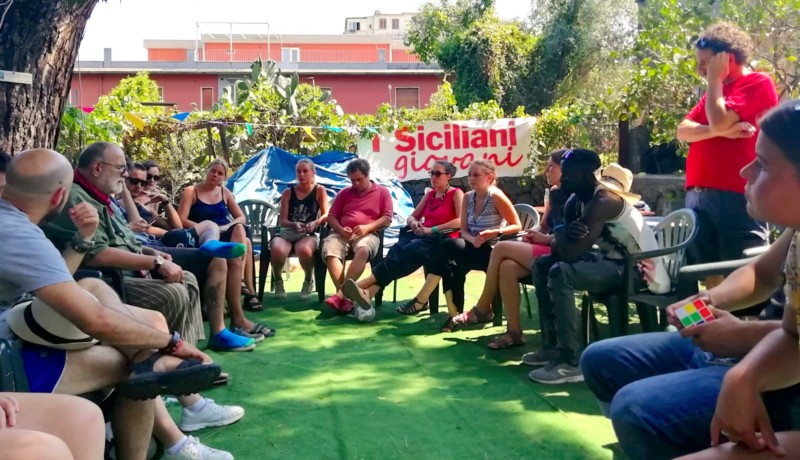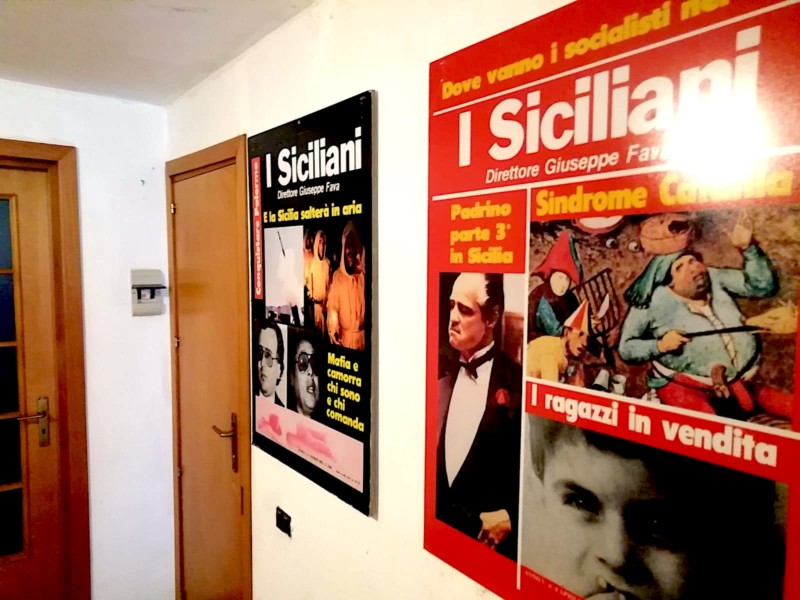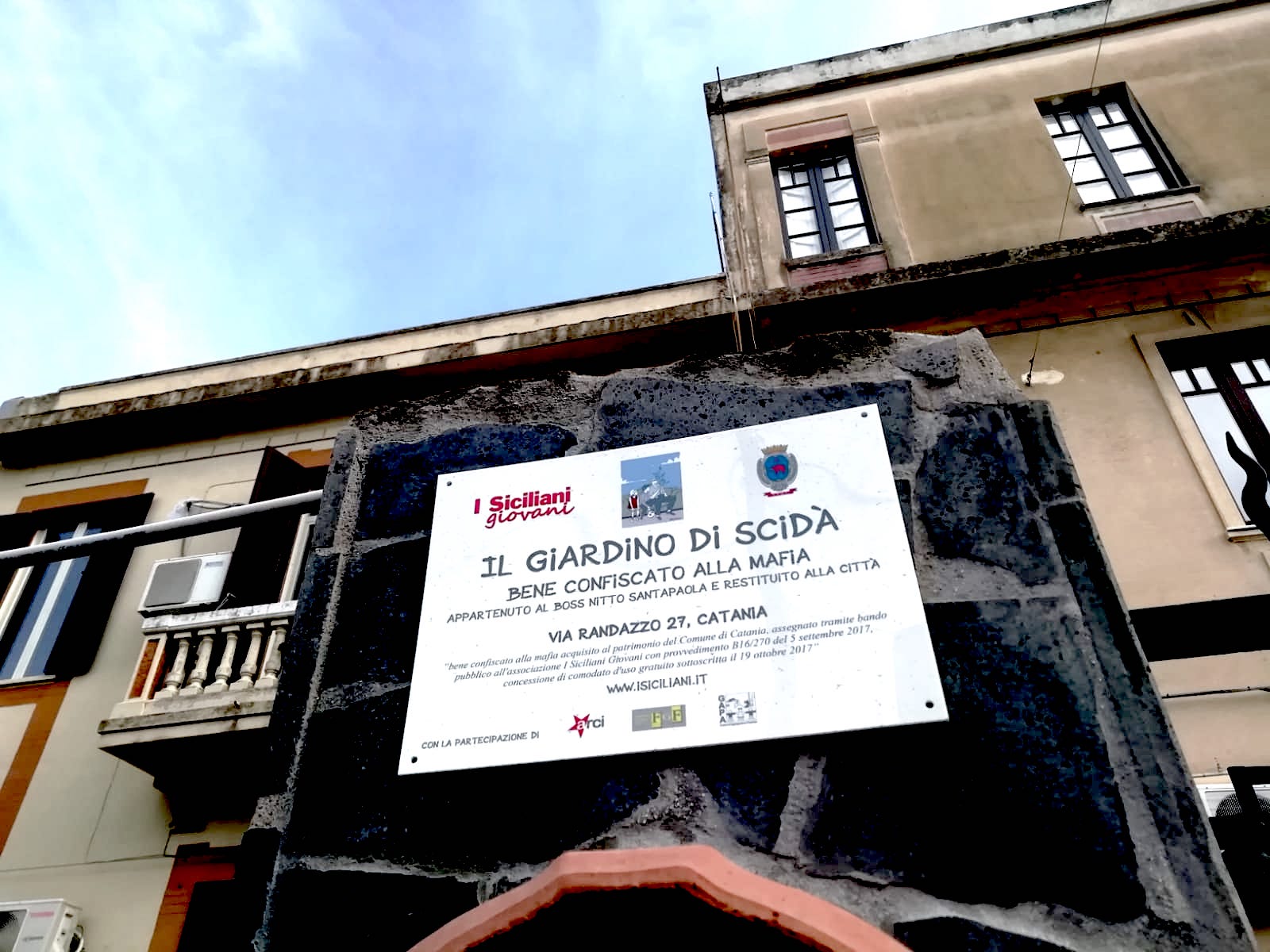Sign up for The Media Today, CJR’s daily newsletter.
On a hot summer day this past July in Catania, Sicily, 21-year-old Mariya Atanasova sat with three other young women in the shade of a tree, talking about a murder. Viktoria Marinova, a Bulgarian journalist, had been killed in that country the previous year. Local authorities ultimately convicted and sentenced a 20-year-old suspect to 30 years’ imprisonment, and a minister in Bulgaria did not link Marinova’s murder to her work. Still, some reporters had found it hard to shake the suspicion that Marinova’s death might have been connected to organized crime.
“I was in shock,” Atanasova told her small audience—all aspiring journalists between the ages of 17 and 21. “None of my classmates expected that. Her story made me feel unsafe.”
ICYMI: Between immigration authorities and the people they target
Atanasova and her acquaintances were in Catania for the first edition of “Journalism Tools to Fight Organized Crime,” a summer camp on anti-Mafia journalism organized by Arci Catania, an NGO that promotes active citizenship, with seed funding from the European Commission. For two weeks, 11 aspiring journalists hailing from various EU countries gathered in Catania, at the former residence of a Mob boss, to learn the basics of field reporting on corruption and crime. The hands-on classes were led by local journalists from I Siciliani Giovani (Italian for “The Young Sicilians”), an investigative magazine founded in 1983 by Giuseppe Fava, a journalist from Catania who was killed by the Mafia on the first anniversary of the magazine’s debut.
“Today, stories are often written from the comfort of an office desk,” says Giovanni Caruso, deputy editor in chief of the magazine and trainer at the summer camp. “I think it’s important to teach younger generations the impact journalism investigations have on our society, since this is something they don’t teach in schools. And that’s a pity, because still today journalists are under threat while delivering an important social service, and not just in Sicily but all over Europe.”

Students and instructors during a group discussion in Scidá’s Garden. Photo via Stefania D’Ignoti.
The murders of Daphne Caruana Galizia, in Malta in 2017, and of Ján Kuciak in Slovakia and Marinova in Bulgaria, in 2018, have brought renewed attention to issues of impunity and journalist safety in Europe. According to the Council of Europe’s 2019 annual report on media freedom in the EU, Italy is among those countries with the highest number of potential impunities, the same as in the Russian Federation. Organized crime remains a leading threat to press freedom; almost 200 Italian reporters currently live under police protection.
This worrying context inspired Mariaelena Urso, an activist and Arci board member, to organize the journalism camp. “We wanted to propose something practical for young people and also give them a chance to compare their experiences with those of other EU countries, using Sicily as a case study,” Urso says. “We thought we had important lessons to share, applicable worldwide.” Sicily, which is home to organized criminal networks operating within as well as beyond Italian borders, has also served as a laboratory for anti-Mafia activism, through organizations such as Addiopizzo and the Fava Foundation.
Urso wanted a venue that would carry symbolic meaning. Arci eventually selected Scidà’s Garden, a property that once belonged to Nitto Santapaola, one of Catania’s most prominent Mafia bosses. In early 2018, the property was returned to the city and transformed into a memorial for Mafia victims,journalists in particular. The space—a secret garden hiding in the basement of a three-story building in a quiet residential area—takes its name from a local judge who worked on Mafia cases to save youngsters from involvement with criminal groups.
“Catania has very few places that celebrate the fight against the Mafia,” says Francesca Andreozzi, granddaughter of Giuseppe Fava and vice president of the Fava Foundation, among the associations currently in charge of the garden. “For some people here, the Mafia never existed. This is why we decided to build a ‘house of memory’ to remember the lawyers and journalists that fought corruption, by building a small multimedia archive containing documents, photos, videos, and posters on the history of Mafia in Sicily.”
The camp features discussion groups on ethics in journalism and lectures from Sicilian reporters who offer tips on organized-crime coverage, as well as practical sessions aimed at honing participants’ reporting skills. Students did not necessarily share a language, so Caruso, who began his career as a photojournalist, encouraged photography as a common language at the camp. Groups of students, accompanied by instructors, spent considerable time in those Catania neighborhoods that have relatively higher crime rates, talking to residents and NGO activists in order to develop story ideas.
Ugne Martuseviciute, who is 17, says films such as The Godfather shaped her more youthful, exotic, naive ideas about the Italian Mafia. “I came because I wanted to challenge my preconceived stereotypes,” she says. During the camp, Martuseviciute, who is about to enroll in a university journalism program in her native Lithuania, reported in Librino, an area locals sometimes refer to as “the Bronx.” Later, she reviewed photos from Librino; students had received instruction on how journalists might use Instagram to tease investigative reports ahead of publication. Learning to effectively share photos taken in challenging and sometimes dangerous situations, Martuseviciute hopes, might help more readers “feel emotionally involved with our stories and concerned about our personal well-being.”
At the Scidà’s Garden residence, on a wall in a narrow hallway, Atanasova noticed the cover of a magazine published July 19, 1992—27 years previous, to the day. The cover’s headlines report the murder of Paolo Borsellino, the Sicilian judge considered the symbol of the local battle against the Mafia, and make reference to his colleague Giovanni Falcone, who was killed by mobsters in a car bomb attack two months before Borsellino.
The “Sicilian Mafia is probably the most famous criminal organization in Europe,” Atanasova says. “So it’s meaningful to be here today, to learn that the risks we face as watchdogs are global, and to commit ourselves to justice in the very place corruption flourished.”

Reproductions of covers from I Siciliani Giovani, a magazine founded by Giuseppe Fava, a Catania journalist killed by the Mafia in 1984. Photo via Stefania Dignoti.
Atanasova—like Marinova, the journalist whose murder so alarmed her—is from Bulgaria. She studies journalism at Sofia University and currently interns at Bivol, which is considered by many to be one of Bulgaria’s few independent media outlets. A Bivol colleague who was investigating alleged fraud had been arrested and briefly held by police last year. Atanasova enrolled in the camp after realizing the threats she could encounter as a woman who aspires to produce investigative work in Bulgaria.
“After what happened to Viktoria I became more aware about an issue we tend to overlook,” Atanasova says. “It made me realize how our rights are constantly disrespected.”
As the camp closed for another summer, a small neighborhood crowd gathered to bid farewell to the young journalists. A selection of photos taken by students during the camp was projected onto one of the garden’s walls while locals chatted with participants, some of whom mentioned being inspired and motivated to pitch their story ideas to outlets in their native countries.
Andreozzi, Fava’s granddaughter, flashed a proud smile while interacting with the young reporters. “In the era of fast and fake news,” she said, “my dream is that new generations of journalists will not forget the importance of field reporting, to carry on the legacy of those journalists we lost along the way, trying to keep us informed and free.”
RECENTLY: Syria’s teen documentarian
Has America ever needed a media defender more than now? Help us by joining CJR today.



